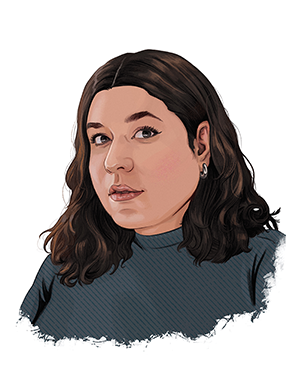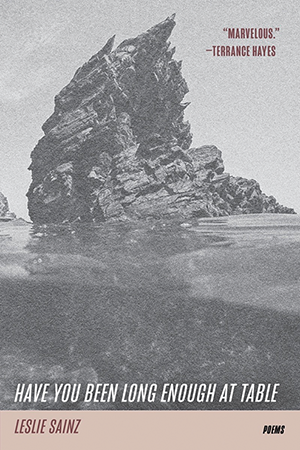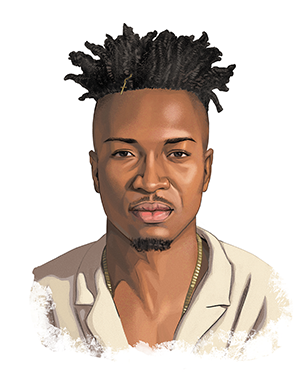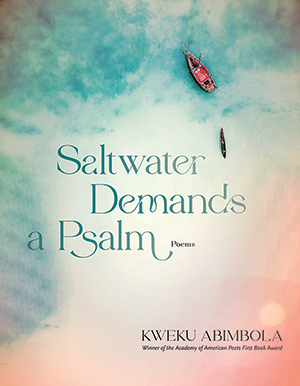Leslie Sainz
Have You Been Long Enough at Table
Tin House
There is no country
where the dead don’t float.
—from “Ño”
How it began: Poetry seemed the only appropriate medium capable of holding the many contradictions that have defined my understanding of self, spirit, and state.
Inspiration: The art of Tania Bruguera, Marta María Pérez Bravo, Zilia Sánchez Domínguez, and Clara Varas. Cuban movie posters from the 1960s and 1970s. Max Richter. Radiohead. Melody Beattie’s book Codependent No More: How to Stop Controlling Others and Start Caring for Yourself (Spiegel & Grau, 2022).
Influences: Hoa Nguyen, Jean Valentine, Blanca Varela, and Federico García Lorca. Their poems never lose the capacity to surprise me, even the ones I’ve reread and re-reread.
Writer’s block remedy: Befriend the silence. I have a rule not to force anything in my life, be that writing, relationships, etc. I want as much softness as possible. When language eludes me, that often looks like asking myself, “In this moment, can I forgive myself if I give up on this poem?” If the answer is yes, I go for a walk, listen to music that devastates me. Afterward there’s usually a reverse psychological effect and I’m desperate to keep at it. If the answer is no, I’ll scour my bookshelves for three books: one I haven’t read yet that poses a challenge, one written in the past ten years that I enjoyed, and a favorite collection published before the year 2000. I’ll flip through all three, searching for answers and, miraculously, stumble into some.
Advice: You cannot be late to your own life. Also, you are allowed your agony.
Finding time to write: While I don’t have the constitution to write every day and most of my activity exists at the mercy of chronic fatigue and illness, I am energized by the looking and obsessing that proacts and enacts poetry. This is made easier, made possible, by catering to my musts. I must write in the evening, after all the day’s unskippable tasks have been completed. I must write following a warm shower, with at least one lit candle nearby. I must have a surplus of other people’s language within reach. These rituals signal to my mind and body that it is time to make contact with language in ways that were previously closed to me as I went about the rhythms of ordinary life.
Putting the book together: Have You Been Long Enough at Table documents many careful unlearnings. There is some linear chronology at work, which was paramount to revealing the ideological evolution of the primary speaker’s politics, but I’m also attracted to a kind of formal contradiction, an unwieldy symmetry. Within the collection there is a series of seven American sonnets, three poems titled “Threat Display,” and eight poems whose titles are severed by a forward slash. I very much enjoyed thinking about how to disperse these poems—how to maximize their emotional and thematic qualities through juxtaposition (and through juxtaposition: suggestion, echo)—while centering the sensation of destabilization. There’s a fair amount of formal diversity in the collection, and as a buttress to the layers of uncertainty inherent in its subjects, I favored a sequence where unpredictability could produce feelings of discomfort in the reader. I see all these structural decisions as mirroring, on a much smaller scale of course, the whiplash of the “Cuban thaw” and its immediate reversal, and the decades of failed U.S. foreign policy imposed upon the island.
What’s next: My unmet needs, and a series of persona poems in the voice of Esther Hicks.
Age: 31.
Residence: Small-town Vermont.
Job: I am fortunate to make my living as the managing editor of New England Review.
Time spent writing the book: Roughly eight years.
Time spent finding a home for it: Three years and five different versions of the manuscript.
Recommendations for recent debut poetry collections: OCTOBERS by Sahar Muradi (University of Pittsburgh Press), Master by Simon Shieh (Sarabande Books), Mass for Shut-Ins by Mary Alice-Daniel (Yale University Press), Organs of Little Importance by Adrienne Chung (Penguin Books), Sweet Movie by Alisha Dietzman (Beacon Press), 回 / Return by Emily Lee Luan (Nightboat Books), Quiet by Victoria Adukwei Bulley (Knopf), Short Film Starring My Beloved’s Red Bronco by K. Iver (Milkweed Editions), and The Border Simulator by Gabriel Dozal, translated from the original Spanish by Natasha Tiniacos (One World).
Have You Been Long Enough at Table by Leslie Sainz
![]()
Kweku Abimbola
Saltwater Demands a Psalm
Graywolf Press
(Academy of American Poets First Book Award)
I knew you before
you could inhabit water
before you could count rains.
—from “Adinkra”
How it began: Healing compelled me to begin Saltwater Demands a Psalm. I was curious about how a return to Indigenous West African conceptions of naming and mourning could help heal the personal and collective moments of anti-Black trauma I’ve experienced since moving to the United States.
Inspiration: The music of the Black diaspora stayed with me throughout the writing process. I see Saltwater, in some ways, as an album that reflects my growth as a listener. The earlier poems are airy and sibilant. Closer to the middle of the collection, we get louder and syllable-heavy, and by the end there is resolve between these two sonic modes. Some musicians that featured heavily in my writing playlist include: Wizkid, Tiwa Savage, Erykah Badu, Ambré, Amaria, Fela Kuti, Marvin Gaye, Burna Boy, and Baco.
Influences: This collection is deeply indebted to the works of Lucille Clifton, Danez Smith, and Ilya Kaminsky. Lucille taught me how to carry water, and how to cherish the language, idiom, and cadence that is most natural to me. Danez injected much-needed voltage into my poetic voice and taught me the potency of the volta. I am quite drawn to Ilya’s use of nuanced, extended similes and metaphors; his writing has a way of sewing itself into my memory.
Writer’s block remedy: Whenever I can’t write I dance; I don my headphones, queue up some Asake or Uncle Waffles or Rema, and dance like the rent is due. Whenever I can’t dance, I go for a walk. Whenever I can’t walk, I reconnect with friends. Whenever I can’t connect with friends, I read. I find my non-writing rituals to be just as vital—if not more vital—as what I do when I’m able to write.
Advice: Write the book you long to read. Pay close attention to what haunts you, to what you cannot shake.
Finding time to write: It’s difficult finding time to write while balancing a full-time teaching load. During the semester I’m mostly able to write during the weekends, whenever I don’t have to grade. During breaks I have the luxury of writing in the mornings, which is hands down my favorite time to write. I’ve also found accountability groups helpful, as well as writing dates—both virtual and in person—with other writers and creators.
Putting the book together: In organizing the manuscript, I took the advice of Cortney Lamar Charleston who noted that whenever you put two poems next to each other, the meaning of both pieces will change. With this conceptual foundation in mind, I sought to order the collection using cycles/shared thematic phrases guided by Adinkra symbols.
What’s next: I’m working on a novel as well as a collection of poems and essays that I’d like to transform into a play.
Age: 26.
Residence: Tampa.
Job: I’m a visiting professor of English and creative writing at the University of Tampa.
Time spent writing the book: About five years.
Time spent finding a home for it: It took close to a year with about twenty rejections before I received my first yes.
Recommendations for recent debut poetry collections: Concentrate by Courtney Faye Taylor (Graywolf Press, 2022), Freedom House by KB Brookins (Deep Vellum), and Heirloom by Ashia Ajani (Write Bloody Publishing).
Saltwater Demands a Psalm by Kweku Abimbola













